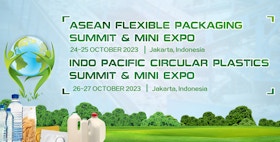
The circular economy represents an alternative, more sustainable model to the traditional linear economy, which will further enhance industry competitiveness and resource efficiency. The unique characteristics of plastics enable them to play a major role on the road to a more sustainable and resource-efficient future.
Lightweight, versatile and durable plastics can help save key resources such as energy and water in strategic sectors that include packaging, building and construction, automotive and renewable energy, to name but a few. In addition, plastics applications in packaging can help reduce food waste.
However, to improve the circularity of plastics, it is essential to make sure that more and more plastic waste is recovered and doesn’t end up in landfill or in the environment. The challenge of curbing plastic waste dates to the dawn of the modern environmental movement.
More recently, concerns over plastic litter, particularly in marine environments, has reached feverish pitch among consumers, governments and companies themselves. Addressing the waste challenge requires engaging the entire plastics value chain, from polymer manufacturers to brands to waste haulers, in order to create truly systemic solutions.
According to reliable industry market research data, only 14 per cent of plastics are recycled, resulting in a loss of as much as $120 billion a year to the global economy. In recent months, some of the world’s biggest brands and plastics manufacturers have issued bold challenges to create new supply chains from plastic waste. It’s a critical start, but success will require broad, global engagement among companies, governments, policymakers and others to create a truly circular plastics economy.
It’s against the above-mentioned industry background that we are launching the upcoming Indo Pacific Circular Plastics Summit 2023, which will gather a good amount of industry professionals and decision-makers coming from all across the plastics value chain, including brand owners or end users, discussing circular plastics development from perspectives of chemical/petrochemical, machinery, supply chain, technology innovation, R&D and recycling, etc., aiming to keep plastics in the economy, out of the environment.
Summit highlights
- Exclusive Insight into Indonesian and Asian Circular Plastics Market: Recovery Rates, Waste Collection Infrastructures, Separation & Dedicated Deposit Systems
- Thoughts on Indonesian and global policy that could impact plastics recycling, waste management and sustainability
- Chemical Recycling Technology to Convert Mixed Plastics Waste into Virgin Quality Polymer – Highlighting the Prospects in Asia
- Perspective on plastic recovery and sorting technology to meet feedstock requirements and specifications for chemical recycling
- Food-grade rPET Recycling Development in Asia: Challenges and Opportunities
- Bringing together all stakeholders in the packaging supply chain to recover plastics waste packaging towards a circular economy
- Regulatory Updates and their impact on Recycled Plastics for Food Packaging in Indonesia
- Sustainable packaging initiatives from the Perspective of a major food delivery company
- Advanced Plastics Recycling Solutions – Pathway towards True Circularity
- Legislative requirements shaping the future market of recycled plastics
- Innovations in Machinery — How it is supporting new recycling dynamics
- Advanced Recycling Solutions for Materials: Recycling of PP, PVC and HDPE
- Bioplastics Prospects within a Circular Economy and Sustainable Future
- End-of-Life Options of Bioplastics—Compost or Recycle?
- Designing eco-friendly products made from sustainable and recycled materials
- For fully circular resources: Beiersdorf’s approach – recycled plastics & waste management
- Recovery of used plastic packaging and expansion of recycling infrastructure
- Evolution in plastic packaging formats helping in the design of recycling
- Debottlenecking pyrolysis-based circularity of post-consumer and landfill plastic waste
- Overcoming Purification Challenges in Advanced Recycling Processes
- Recycling’s Role in the ocean-bound plastic and pollution crisis
- Achieving Circularity with Bio-Based Materials: Rethinking Hard-to-Recycle Plastics
- Panel Discussion: Transforming the New Plastics Economy— How the future sustainable plastics will evolve?
- Enable full circularity for plastics through innovation and partnerships
- Unlocking the recycling potential with collection & sorting
- Future market potential for recycled materials and plastics
- Panel Discussion: Chemical recycling VS. Other end-of-life treatment (Mechanical recycling, Composting, Waste to Energy and Incineration)
Hubung Penaja/Peserta Pameran
James Chen
[javascript protected email address]
Publish your content with EB Publishing
It's about who you reach. Get your news, events, jobs and thought leadership seen by those who matter to you.


